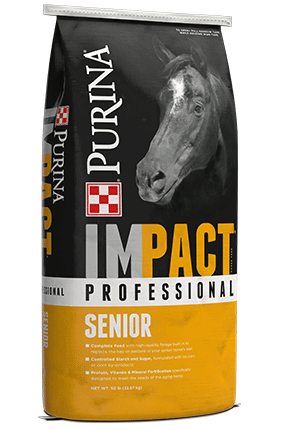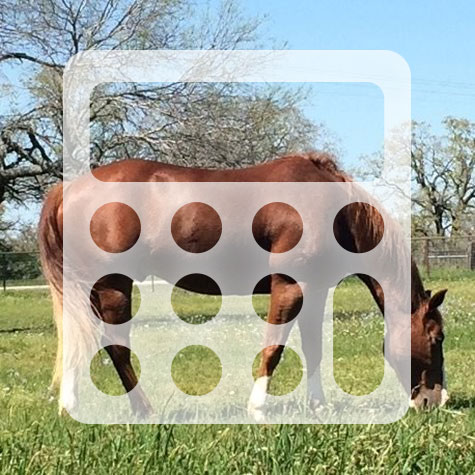Purina® Equine Senior® Horse Feed
When your equine partners and trusted companions reach their golden years, help support their good health for years to come with Equine Senior® horse feed, specifically made to meet the nutritional needs of the aging horse. A carefully balanced feed with fiber built-in that is easy to chew and digest even with dental limitations, its patented formula supports the overall health of senior horses with Amplify® High-Fat Nugget to promote ideal body condition, ActivAge® for immune support, and Outlast® for gastric health and comfort.
-
See Full Details
NUTRITIONAL INFORMATION
Guaranteed Analysis
Ingredients
Feeding Directions
-
Guaranteed Analysis
Nutrient Min/Max Amount Crude Protein MIN 14.00 % Lysine MIN 0.70 % Methionine MIN 0.18 % Threonine MIN 0.40 % Crude Fat MIN 5.50 % Crude Fiber MAX 18.00 % Acid Detergent Fiber (ADF) MAX 23.00 % Neutral Detergent Fiber (NDF) MAX 39.00 % Dietary Starch MAX 12.00 % Sugars MAX 7.00 % Calcium (Ca) MIN 0.50 % Calcium (Ca) MAX 1.00 % Phosphorus (P) MIN 0.40 % Sodium (Na) MAX 0.55 % Chloride (Cl) MIN 0.40 % Magnesium (Mg) MIN 0.33 % Potassium (K) MIN 1.20 % Manganese (Mn) MIN 220.00 PPM Cobalt (Co) MIN 0.60 PPM Copper (Cu) MIN 55.00 PPM Iodine (I) MIN 3.30 PPM Selenium (Se) MIN 0.30 PPM Zinc (Zn) MIN 220.00 PPM Sulfur (S) MIN 0.45 % Iron (Fe) MIN 220.00 PPM Vitamin A MIN 3500 IU/LB Vitamin D3 MIN 700 IU/LB Vitamin E MIN 140 IU/LB Ascorbic acid (Vitamin C) MIN 226.00 mg/lb Thiamin MIN 11.34 mg/lb Riboflavin MIN 9.07 mg/lb -
Ingredients
- For specific ingredient listing for this product
- please refer to the feed tag affixed to the package in your region or contact us at 800-227-8941.
-
Feeding Directions
Description
Start with the amounts of Equine Senior® horse feed given for the weight and lifestyle of the horse. After observing the horse for a period of time, the amount fed may be gradually increased or decreased to obtain the desired body condition and weight. For feeding directions outside the ranges addressed in these feeding charts, please contact your local Purina retailer or Purina Customer Service at 800-227-8941.
FEEDING WITHOUT FORAGE
| WEIGHT OF HORSE IN POUNDS Lifestyle 800 1,000 1,200 Equine Senior® Horse Feed (lbs/day)* Maintenance 10.75 13.50 16.25 Light Work 11.75 14.75 17.75 Moderate Work 14.00 17.25 20.75 Breeding Stallion 13.00 16.25 19.50 * Feeding recommendations are based on average daily requirements. Actual feeding rates may vary due to individual metabolism and progression rate of the aging processes and may need to be gradually adjusted.
Aging horses unable to maintain adequate body condition when being fed the recommended amount of Equine Senior® horse feed should be examined by a veterinarian for potential health issues.
FEEDING WITH FORAGEWEIGHT OF HORSE IN POUNDS Lifestyle 800 1,000 1,200 (lbs/day) Hay or Equivalent Pasture* 8.00 10.00 12.00 Equine Senior® Horse Feed (lbs/day)* Maintenance 5.50 7.00 8.25 Light Work 6.50 8.25 10.00 Moderate Work 8.75 10.75 13.00
Purina® Equine Senior® horse feed is designed to replace all or a portion of the required forage in a horse's diet. If forage replacement is not needed, consider feeding Equine Senior® Active or Strategy Healthy Edge®.
* Make sure your horse is free of dental problems and can effectively chew and utilize forage. If feeding more hay, reduce the amount of Equine Senior® horse feed by 1.0 lb for every additional 1.5 lbs of hay. If feeding less hay, increase the amount of Equine Senior® horse feed by 1.0 lb for every 1.5 lb decrease in hay fed.
** To meet nutrient requirements, do not feed less than 0.6 lbs per 100 lbs of body weight per day. If your horse gains too much weight at that minimum feeding rate, transition to Purina® Enrich Plus® Ration Balancing Feed.
A 6 lb meal of Equine Senior® Horse Feed supplies a full serving of Outlast® Supplement.Caution
Follow label directions: feeding added selenium at levels in excess of 0.3 ppm in the total diet is prohibited.
Wash hands after feeding/handling animals. Not for human consumption. Wash feed/water containers regularly.Important
1. Feeding rates will vary with size, age, temperament, health status, forage quality, climate
and activity level. Feed at regular times, at least twice daily. Do not feed more than 0.8 lbs/100
lbs of body weight per meal when fed without forage or more than 0.5 lbs/100 lbs of body
weight per meal when fed with forage . Do not feed free-choice. Prevent rapid eating
by the horse of any feedstuff.
2. Reduce and/or delay feeding a horse which is hot, excited or showing pain, has fever or
diarrhea. Consult your veterinarian if any problems arise.
3. Any feed changes should be made gradually over a period of 7 to 10 days. Changes in the
rate of feeding should not exceed 1.0 lb per day for each horse.
4. Provide fresh, clean water at all times. Provide your horse with access to salt. Consult with
your veterinarian regularly and maintain a routine dental, parasite control and health care
program for your horse.
For horses sensitive to dietary carbohydrates, please consult with a veterinarian or nutritionist for a
recommended diet.
-
Guaranteed Analysis
-
Learn More
CONTINUOUSLY INNOVATING ANIMAL NUTRITION
Purina is relentlessly seeking the next innovation in animal nutrition and targets relevant issues facing animal owners to help enhance their animal raising experience.
CONTINUOUSLY INNOVATING ANIMAL NUTRITION
Purina is relentlessly seeking the next innovation in animal nutrition and targets relevant issues facing animal owners to help enhance their animal raising experience. We’ve conducted over 24,000 animal nutrition studies and counting to find impactful, accessible solutions for animals and their owners.
Our research is performed in fields across the country and on our 1,200-acre working farm in Gray Summit, MO, the Purina Animal Nutrition Center, where we care first-hand for over 3,000 animals, every single day, ensuring our outputs of research, knowledge, and product innovation work properly for the real-life needs of animals.

.png?width=72&height=72&ext=.png)
Driven By Science
& Our Love of Animals
Purina understands and cares about the unique needs of your animals and the importance of bettering their well-being, performance and health. For more than 125 years, we have been tackling the biggest horse nutrition challenges using science, and our love of horses pushes us until we get it right. Our team is made up of more than 500 Masters of Sciences, Ph.Ds., veterinarians, nutritionists, microbiologists, geneticists, and immunologists, all who share a passion for providing animals with the best nutrition for the best results.

.png?width=72&height=72&ext=.png)

Purina understands and cares about the unique needs of your animals and the importance of bettering their well-being, performance and health. For more than 125 years, we have been tackling the biggest horse nutrition challenges using science, and our love of horses pushes us until we get it right. Our team is made up of more than 500 Masters of Sciences, Ph.Ds., veterinarians, nutritionists, microbiologists, geneticists, and immunologists, all who share a passion for providing animals with the best nutrition for the best results.
Need additional nutritional advice for your horse?
Send us your question and an equine specialist from Team Purina can help.
Ask an Expert











.jpg?width=480&height=480&ext=.jpg)





